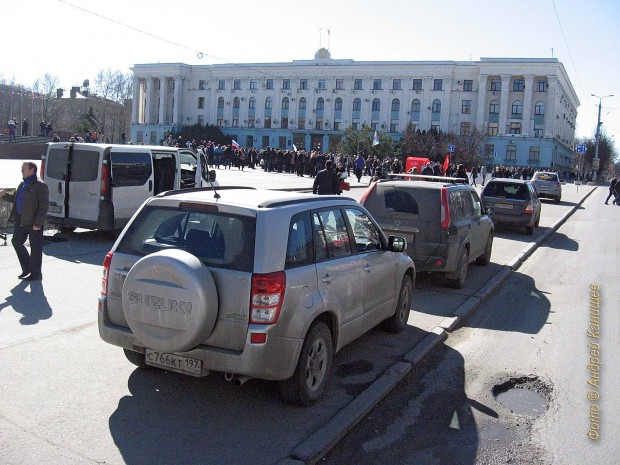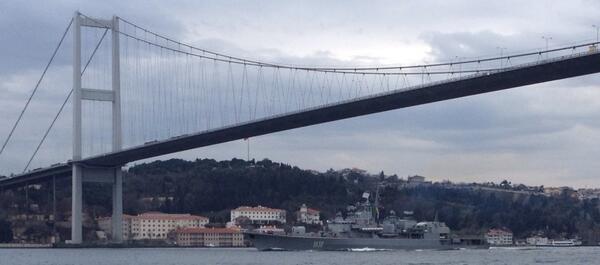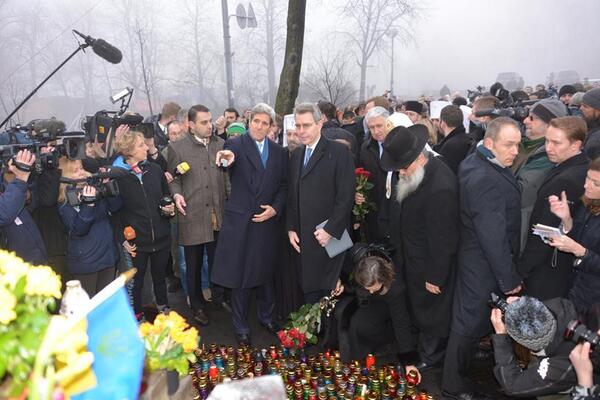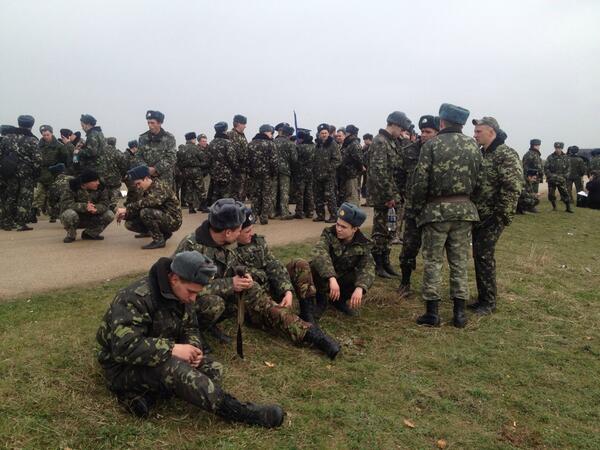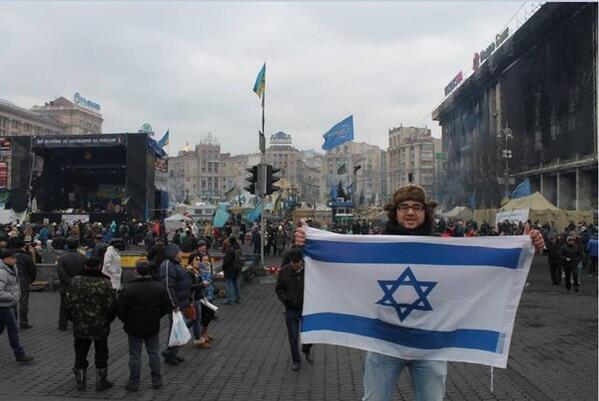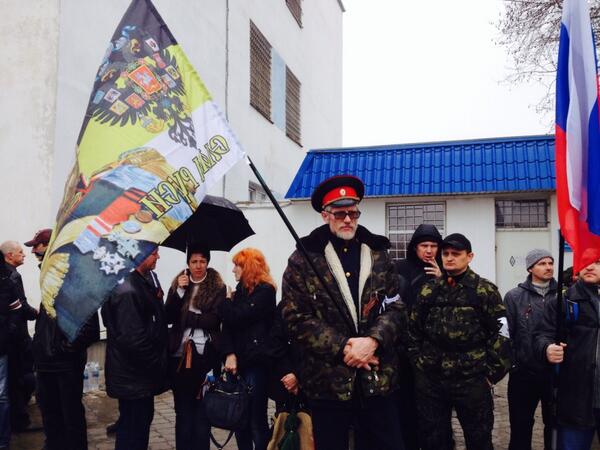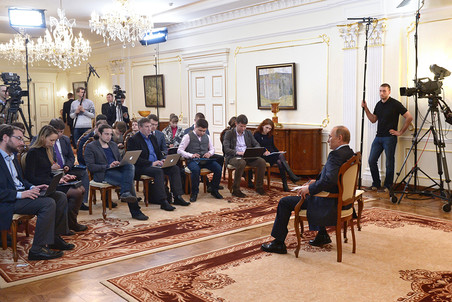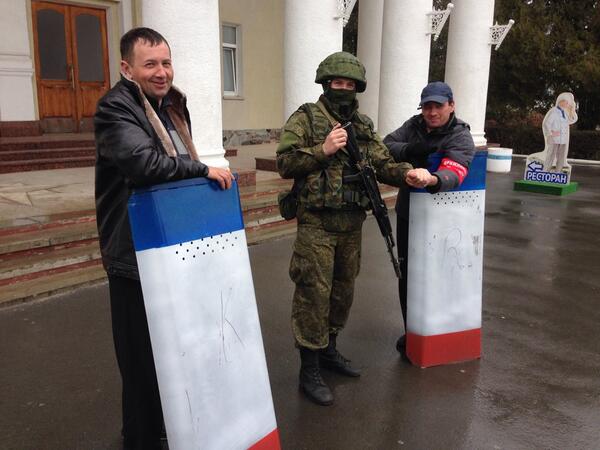Russian troops are building up in the Crimea, but backing off in other areas. Russian troops have not assaulted Ukrainian bases in Crimea as promised, but Putin says the use of force may be necessary. What happens is anybody’s guess, but we’ll be covering it live when it happens.
Yesterday’s liveblog can be found here. For an overview and analysis of this developing story see see our latest podcast.
Below, we will be making regular updates throughout the day:
Andrei Kanishchev, the brave photojournalist in Simferopol whose pictures and terse stories we’ve been publishing in recent days (such as at the top of yesterday’s liveblog), was missing for a day and his friends were concerned.
But Andrei was back tonight with his usual literary flair, quoting Mark Twain about rumors, and recounting the story of his detention on suspicion of “provocation” while covering a demonstration:
“Thanks to everyone who managed to get through on the phone until the officer on duty began getting additional signed statements from me that the police had not hindered my journalistic activity, and the commander of the self-defense sotnya who had captured me left his telephone number, urging me to call any time.
I am alive, healthy, and my soap box [nick-name for a point-and-shoot camera] tied up in string has survived. That is, I wasn’t beaten (well, I was shoved pretty hard in the back), and my gear, thank God, wasn’t dragged out of my pocket (I clutched the soap box in my fist). The police turned out to be high quality — they were so competent and worked so efficiently that I didn’t have time to get frightened — I was plucked out of the crowd and driven to the police precinct. Now I’m home and pondering whether to keep up my blog on quiet Simferopol further.”
Yesterday, Kanishchev wrote dryly about the photo of a rally outside the government building taken above, “Apparently the proper way to drive to the people’s rallies nowadays is in jeeps. For the bosses — yes, sir!” If you look closely at the jeep in the foreground, you can see a license plate from the Russian Federation.
2300 GMT:The Russians tested a Topol [Poplar] ICBM in Astrakhan Region today, RIA Novosti reported. Our translation of an excerpt:
“The purpose of the launch was a test of a prospective payload of inter-contintental ballistic missiles. The training part of the missile with assigned accuracy struck a conditional target at the Sary Shagan proving ground (in the Republic of Kazakhstan),” the Russian Defense Ministry said in a press release.
The news was greeted with different interpretations by various experts, depending on their existing outlook on Russia:
OK: this ICBM test was planned long in advance, and US had been notified. Russian ships pass through the Bosphorus constantly. Calm down.
— Joshua Kucera (@joshuakucera) March 4, 2014
Russia reportedly test-fired an ICBM today, the not-so-subtle message to the U.S. clear: Stay off our turf, we can still reach yours.
— Dave (@YouGiveMeFever7) March 4, 2014
The BBC’s diplomatic correspondent Jonathan Marcus says “such tests are planned long in advance, but that it inevitably adds another element of Cold War-style tension to the current crisis.”
2246 GMT: As Western capitals debate how they should respond to Putin’s invasion of Ukraine, the issue of France’s arms sales to Russia is again in focus for activists. Here’s a summary translation of Vincent Jauvert’s column in the French newspaper Le Nouvel Observateur:
The US has suspended military contacts with Russia. Now there are growing calls for France to stop its € 1.2 billion sale of two Mistral warships, an unprecedented contract between a NATO country and Russia. The first ship, the Vladivostok was launched in October and is supposed to be delivered to Russia this year. The second, still to be built, has already been named the Sebastopol by the Russians and is for their base in the Crimea.
The French government has condemned the Russian military intervention in Ukraine and announced that Paris will not take part in the G8’s preparatory meeting. But is it enough? Shouldn’t France give up this military contract or at least suspend it? The shipyards are located in Saint-Nazaire, home of Prime Minister Ayrault, which could be an explanation for the issue not being raised in Paris.
2218 GMT:Aleksey Pushkov, chairman of the Russian State Duma’s Committee on International Affairs, has some sharp words for US efforts to help Ukraine:
США и ЕС начали спасать киевскую власть от финансового обвала.Но помощь будет минимальной.Золотого дождя не будет,затягивание поясов – будет
— Алексей Пушков (@Alexey_Pushkov) March 4, 2014
Translation: The US and EU have begun saving the Kiev government from financial default. But the aid will be minimal. It won’t be a golden rain but will be a belt-tightening.
2205 GMT:We began the day by noting that German Chancellor Angela Merkel had spoken to Putin on the phone and said she was not sure he was in touch with reality. “In another world,” she said, the New York Times reported.
Now Victoria Nuland, Assistant Secretary, Bureau of European and Eurasian Affairs, is saying that Russia is in “a parallel reality.” Below is the reply to the Russian Federation on Ukraine at the Special Meeting of the Permanent Council of the Organization of Security and Cooperation of Europe (OSCE), the multilateral body that implements the 1975 Helsinki Act:
Because Ambassador Kelin’s remarks were intermittently addressed to us, I thought it best to respond immediately to the parallel reality that was presented here to the situation that the vast majority of the rest of the delegations here see in Ukraine.
First and foremost, the assertion that EU nations or the United States “pushed an Association Agreement on Ukraine”: Just to correct the record there, it was President Yanukovich’s own choice to seek association with the European Union. We were at the time supporting the choice of the freely elected government of Ukraine in seeking association with the European Union, but it was very much a European Union project. And it was President Yanukovich who pursued that policy for six months, including seeking some 18 conforming pieces of legislation approved in the Rada, and only one week before Vilnius stepped back from that. So I don’t know how anyone can speak of the United States or anybody else “pushing” that choice on Ukraine.
Second, we were supporters of the February 21st Agreement: We commended the work done by France, Germany and Poland to mediate and negotiate that agreement, with Russia very much in observance, and we would have been prepared to support its completion. But it was President Yanukovich who chose not to sign the first piece of action pursued in the Rada, the changing of the constitution pursuant to the agreement. Not only did he not sign it, but he left the city – he fled the city – packing himself and his family up, and left the seat of the presidency vacant for two days, during which time the democratically elected Rada nearly unanimously voted him out of office, including every single member of his own party turning against him. So, from where we’re sitting, there is no way a person who takes those decisions can be considered still the legitimate leader of his country.
Third, the notion that the current government in Kyiv is “illegitimate”: Yes, the vast majority of representatives in the government are either from a small handful of political parties or from civil society, many of them having never served in government before, and representing broad constituencies across Ukraine. But that is not because this government does not have broad political support across the spectrum and across the country – in fact, the government was voted in with a very, very broad mandate, including from the Party of Regions, from the independents, from the Communists. However, those parties chose not to accept invitations to participate in government; they’ve publicly explained that they want to distance themselves from having to clean up the mess that Yanukovich left, and they want to run on their own platforms in the May 25th election. So, it is incorrect and inaccurate to assert that either nations of the West destroyed the February 21st Agreement, or that the current government is illegitimate – it was elected into office by a very broad mandate from a democratically elected parliament and was the result of President Yanukovich fleeing the scene.
Last point – aggression, intervention, who’s responsible for violence: From where we sit, there is no way to justify a deployment of some six-to-eight thousand troops, all across the Crimean Peninsula, effectively taking operational control of all of the ground of Crimea, including ground troops, airborne troops, tanks. There was no situation on the ground anywhere in Ukraine to justify unilateral military action of this kind. Once you go down the road as an OSCE State of asking your parliament to justify military intervention in anybody else’s country, where does it end?
So, from that perspective, I would like to again reiterate our call that we end this here – that Russia roll back its occupation of Crimea and avail itself of the opportunity to have any concerns it may have with regard to the situation in Ukraine addressed through direct mediation with the government of Ukraine, which all of us would be prepared to support, and/or by taking advantage of international tools like those available in this institution and in the UN.
In my opening intervention, I neglected to mention one key tool that the OSCE has, which is the opportunity to assist Ukrainian authorities – and they have already requested this – with demobilization of irregular forces on the streets of Ukraine and the collecting of weapons. That’s an additional tool that this organization has available.
2117 GMT: The Ukrainian Fleet News website, Flot Ukraiyni has published a statement from the “command of the Sevastopol brigade of surface ships, and the crews of the Ukrainian Navy ships Slavutych and Ternopil to the international media”. In their statement, they assert that President Putin is lying about the identity of the armed forces operating in Ukraine. They state that the ships and soldiers surrounding their vessels are, without doubt, from the Russian Black Sea Fleet. This translation was provided by XX Committee:
We, sailors of the Ukrainian Navy, have listened attentively to the position and thoughts of the president of the Russian Federation, Vladimir Putin, which he delivered during a news conference in Moscow on 4 March 2014.
Speaking to a Reuters journalist, the Russian president subtly displayed the skills of a diplomat in avoiding answering questions. But we are military people and, as it is known, we tend to speak and act directly, after diplomats exhaust their mutual arguments.
Proceeding from this, we think that we have the right to accuse the president of the Russian Federation of a baldfaced lie. A lie that concerns the direct participation of the Russian Armed Forces in the events which have been unfolding on the territory of the Autonomous Republic of Crimea and the city of Sevastopol over the last few days and today too.
The Ukrainian Navy warships Ternopil and Slavutych, which are moored in Sevastopol Bay, are currently blocked by warships and vessels of the Russian Black Sea Fleet, and they are all carrying detachments of marines numbering up to a platoon. They are armed with automatic weapons and equipped accordingly.
Bearing in mind the remarks of Mr. Putin that such gear and equipment can be bought in any shop, we would like to seize the moment and ask which shop – as well as where one can purchase automatic weapons, pistols and grenade launchers in violation of Ukrainian legislation? We also would like to recall that no unit of the Ukrainian Armed Forces deployed in Crimea gave up even a single inch of the territory of their military bases or the weapons entrusted to them, let alone in such quantity, as all units remained faithful to the call of duty and their oath to the Ukrainian nation.
In response to all these insinuations, and the flows of mendacious information disseminated by dirty politicos and corrupt journalists, we – officers, warrant officers and sailors of the Ukrainian Navy – openly declare that we will honestly carry out our soldier’s duty till the end, we will defend our country and the Ukrainian people as we have been doing through all the years of independence, not for the sake of posts or salaries, but because this is our land and we cherish the lives of every person who lives on this land regardless of nationality.
Personnel of the brigade of surface ships,
4 March 2014
Sevastopol
2100 GMT: The United Kingdom has, while maintaining tough rhetoric towards Russia’s invasion of Crimea, been rather less enthusiastic about the prospect of financial sanctions against Russia. On the domestic front, Oliver Bullough writes in New Republic on the degree to which the lives of wealthy Russians are intertwined with London. Drawing on the example of Andrey Yakunin, son of Russian Railways head Vladimir, and his London household, Bullough notes that:
The Russian economy is vulnerable. The ruble has tumbled, as has Russia’s stock market too. But that will not bother the elite, which keeps its money in dollars and spends as much time in the West as in Moscow—and that encapsulates how hard it is for Europe to take action. In London, thousands of people—the estate agent who sold 88 West Heath Road [to Yakunin]; the brokers who shift Andrey Yakunin’s stock; the lawyers who sign off on his deals; Igor’s teachers—have a piece of Russian action.
Andrey Yakunin’s son, Igor, is one of a great number of Russian children who attended British private schools, the financial revenue from which is vast:
Take British private schools. According to the Independent Schools Council, there were 2,174 Russian children boarding in the UK last year (Igor Yakunin is a day boy at Highgate School, so doesn’t feature in the statistics). Average fees are $15,000 a term, meaning Britain earns somewhere around $100 million a year from Russians in school fees alone. If Prime Minister David Cameron imposes sanctions on the Russian elite, he’ll have to explain why a quarrel in a faraway country means private schools should lose that revenue stream.
It is not just education and property (Bullough cites an estate agent’s estimate that Russians purchase almost 5% of the top level property in London,) but the legal services available to them in the city:
English law regulates many energy contracts in Russia, and oligarchs love using the London courts to resolve their disputes. Reports in The Lawyer detail the sums of money on offer, with lawyers regularly picking up millions from oligarch clients. More than 60 percent of the London Commercial Court’s workload now comes from Russia and Eastern Europe, and the pay-offs are huge. Lord Sumption waited until he had finished defending Russian billionaire Roman Abramovich, for a reported fee of $5 million, before taking up a position on Britain’s Supreme Court.
Further afield, BP has made an unequivocal defence of it’s investments in Russia, including it’s nearly 20% stake in the state-owned oil company Rosneft. Announcing that “we absolutely stand by our investment in Russia”, their American CEO defended their work with Rosneft, citing “good results this year”. Rosneft’s benefit is of course, benefit for the Kremlin itself.
2005 GMT: Christopher Miller has written a report on today’s warning shots fired outside Belbek airbase. He adds an important and chilling detail:
The soldiers remained there — under the close watch of Russian elite forces armed with machine guns rifles and mortars and blocked by military jeeps — throughout the afternoon as negotiations between Mamchur and a man known only as “Roman” took place behind Russian lines.
“They [Russian soldiers] told us: ‘Stop. Do not come closer. We have orders to shoot,’” said Andriy Matchenko, deputy head of logistics for the Belbek.
“They said they would shoot at our legs if they needed to stop us.”
Read the rest of the report here.
1945 GMT: A reminder that with this many pieces in motions, on all sides, a single bullet could easily trigger a war:
2 Russian warships steamed through Istanbul's Bosphorus Strait this morning en route to Black Sea…and undoubtedly Crimea.
— Ivan Watson (@IvanCNN) March 4, 2014
Ukrainian warship "Hetman Saraidachny" steamed thru Istanbul's Bosphorus to Black Sea hours behind 2 Russian warships pic.twitter.com/Y4kPjfOsLa
— Ivan Watson (@IvanCNN) March 4, 2014
1933 GMT: Now a statement from the US on the intercontinental ballistic missile test:
#Russia ICBM test was planned ahead of #Ukraine and US had been notified of window, US official tells @LMartinezABC
— Alexander Marquardt (@MarquardtA) March 4, 2014
But how long ago was this missile test scheduled? After all, ballistic missile tests are always scheduled so that countries seeing the weapons on radar don’t accidentally start a nuclear war.
A note: according to RIA Novosti, the weapon tested was the rs12m rather than the rs12m1. According to Wikipedia this version has been undergoing life extension tests in 2011 and 2012.
Russia is undergoing an aggressive modernization of their nuclear arsenal. The Interpreter’s Andrew Bowen examines why that is in a his analysis, Why Nuclear Weapons Continue to be Central to Putin and Russia
1928 GMT: Earlier we reported that an anchor for Russian state-owned RT.com did an editorial where she said she disagreed with Russian policy in Ukraine. (jump to update 1440 for video and analysis).
RT.com has sent this message to the Huffington Post:
Russia Today responds, telling HuffPost UK: “Contrary to the popular opinion, RT doesn’t beat its journalists into submission, and they are free to express their own opinions, not just in private but on the air. This is the case with Abby’s commentary on the Ukraine.
“We respect her views, and the views of all our journalists, presenters and program hosts, and there will be absolutely no reprimands made against Ms. Martin.
“In her comment Ms. Martin also noted that she does not possess a deep knowledge of reality of the situation in Crimea. As such we’ll be sending her to Crimea to give her an opportunity to make up her own mind from the epicentre of the story.”
Interestingly, Abby Martin tweeted out that she’s not going:
Hi @Josiensor, thanks for your article. But I am not going to Crimea despite the statement RT has made. Please update accordingly.
— Abby Martin (@AbbyMartin) March 4, 2014
1921 GMT: Russia has test-fired an intercontinental ballistic missile today. Reuters reports:
The Strategic Rocket Forces launched an RS-12M Topol missile from the southerly Astrakhan region near the Caspian Sea and the dummy warhead hit its target at a proving ground in Kazakhstan, the state-run news agency RIA cited Defence Ministry spokesman Igor Yegorov as saying.
Rabbi Vadim Rabinovich announced today that the Jewish Community of Ukraine will report in Brussels to the European community about anti-Semitism in Ukraine — or to be more accurate, about the lack of a surge in hate crimes since the start of unrest in Ukraine, Interfax Ukraine reported.
Rabbi Rabinovich held a telephone conversation with all the regional Jewish communities of Ukraine and posted the results on the Internet. Each region and city has provided information. Despite the difficult situation in Ukraine, everything is fairly calm in all the Jewish communities and no outbursts of anti-Semitism have been observed, he said. As Rabbi Rabinovich stressed, the need to accurately inform the public of Europe and the whole world emerged after a number of speculative and provocative statements surfaced regarding an alleged surge in anti-Semitism recently in Ukraine. “As Vadim Rabinovich emphasizes, such statements have not been confirmed by residents of the Jewish communities locally,” Interfax Ukraine reported.
Last week Rabinovich refuted reports appearing in the foreign press about anti-Semitism in Ukraine.
Note, Anshel Pfeffer of Haaretz has told us that while Vadim Rabinovich is a Jewish leader, he is not a rabbi.
1759 GMT:Rabbi Yaakov Dov Bleich, a chief rabbi of Ukraine, at a press conference in New York today at the United Jewish Communities of Eastern Europe accused Russia of staging anti-Semitic “provocations” in Crimea in order to justify its invasion of the former Soviet republic, JTA reported.
The online Russian-language publication izrus.co quoted Bleich from the Manhattan press conference:
“We expect that there will be provocations. We expect that the Russians will want to justify their invasion of Ukraine. They are already stating in the media that the Banderaites are running around and attacking synagogues — but there is none of that. There can be provocations — some one may dress up as a Ukrainian nationalist and begin beating Jews. I don’t fear this comparison — this is what the Nazis did during the Anschluss in Austria.”
1728 GMT: Crimean Tatar TV station, ATR.ua in Simferopol reported at 14:00 local time today that, after a night of waiting for an assault that never came, unarmed Ukrainian airmen have gone back to their base in Belbek. Talks broke down when some unarmed men in Berkut uniforms and some in army uniforms, who called themselves the “Sevastopol Self-Defense” appeared and said they were authorized to conduct talks now. The Ukrainian air force decided to return to base.
But on the road back, they encountered some armed personnel, who Putin, in his press conference today, had said were “Crimean Self-Defense”. However, as ATR specialists noted they were “too well-equipped and trained to be militiamen, they looked more like a regular army.” Even so, they were unable to reach a compromise and returned to Belbek.
1711 GMT: Interfax Ukraine reports on the ongoing blocking of two Ukrainian naval vessels by Russian ships in Sevastopol. In addition to the two ships mentioned here, the command vessel, Slavutych is also surrounded in the same port.
For the second day now, the Russian Federation Black Sea Fleet is blocking two ships in the city of Sevastopol, Pavel Shysholin, first deputy head of the Ukrainian Border Service announced.
“For the second day in a row the Russian Fleet, including the missile cruiser Moskva, is blocking the approaches to two ships, Streletskaya and Sevastopolskaya,” he said at a briefing in Kiev.
1642 GMT: NATO has issued a statement following their meeting, requested by Poland, under article 4 of the Washington Treaty. The treaty states “the parties will consult whenever, in the opinion of any of them, the territorial integrity, political independence, or security of any of the parties is threatened.”
Despite repeated calls by the international community, Russia continues to violate Ukraine’s sovereignty and territorial integrity, and to violate its international commitments.
These developments present serious implications for the security and stability of the Euro‑Atlantic area.
Allies stand together in the spirit of strong solidarity in this grave crisis.
We undertake to pursue and intensify our rigorous and on-going assessment of the implications of this crisis for Alliance security, in close coordination and consultation.
We continue to support all constructive efforts for a peaceful solution to the current crisis in accordance with international law. We welcome the ongoing efforts undertaken by the United Nations, the European Union, the OSCE and the Council of Europe.
We will continue to consult with Ukraine within the NATO-Ukraine Commission.
We will engage with Russia in the NATO-Russia Council. We will hold a meeting tomorrow.
1617 GMT: Today, the USA and the EU are offering financial aid to Ukraine in order to secure it’s energy needs. But, in his press conference this afternoon, Vladimir Putin has stated that Gazprom will no longer adhere to the discounted prices agreed with then-president Yanukovych:
Gazprom is not returning to old prices, it does not want to extend the existing discounts, about which there was an agreement to introduce them or not, every quarter….Gazprom agreed and the Government of the Russian Federation agreed that Gazprom was discounting up to $268.5 per 1,000 cubic meters. The government of Russia provides the first tranche of the loan, it is formally not a loan but the purchase of securities — a quasi-loan, in the first stage, $3 billion. And Ukraine obliges itself to pay down the debt which emerged in the second half of last year and pay on time the ongoing payments for the product consumed — for consumed gas. The debt isn’t paid, the ongoing payments are not paid in full.
1552 GMT: Ukraine is in a financial spot. Because it ended its bid to join the European Union (which started this crisis), it did not receive a loan from the EU. Russia pledged $15 billion, but only delivered $3 billion, and has pulled the rest.
Today, the EU has pledged additional financial support (translated by The Interpreter):
The EU will help Ukraine settle it’s $2 billion debt for their Russian gas purchases, and may also provide them with gas, announces the European Commissioner for Energy, Gunther Oettinger. “The payment of gas bills owed by Ukraine features prominently in the European Commission’s aid program” which will be adopted on Wednesday, he declared at the close of a meeting of European energy ministers.
US Secretary of State John Kerry has also announced a $1 billion energy subsidy package today.
Speaking of Kerry, he has landed in Kiev and is visiting Maidan Square today:
#US Secretary of State John #Kerry at the place where around100 #ukrainian protesters wereMurdered bySnipers onFeb.20 pic.twitter.com/mXiP2UydgH
— Euromaidan PR (@EuromaidanPR) March 4, 2014
1534 GMT: So is there a deescalation in Ukraine today? Maybe, but Izvestia, another pro-Kremlin media outlet, is planning on a Russian war to conquer all of Ukraine which, Izvestia argues, would not be that hard (excerpt translated by The Interpreter):
“The troops of the Central and Western military districts will be deployed on the Ukrainian‑Russian border on the north and east sides. The Central District troops, for example, can get deployed on the border with the Luhansk region. What happens next depends on the political situation,” said Vyacheslav Tseluyko (a Russian security expert).
According to him, the Crimea could become an operational zone for Russian Airborne troops and forces of the Southern Military District. In addition to the regular army, special forces may be deployed in this region.
Meanwhile, due to the general mobilization in Ukraine the country’s military manpower will increase within a week. According to Vyacheslav Tseluyko, the numbers of the military equipment of all the armed forces, most of which have been kept in storage, will also increase.
“In the next few days the numbers of the Ukrainian army will increase by several times. The buildup and deployment of additional units continue. Military equipment is being released from the storage bases. For example, the number of tanks can grow 3-4 times, twofold if you count only those in good repair and operational,” said the source.
“The Ukrainian army is located mainly in the western and central parts of the country, the manpower comes predominantly from these regions, that are more loyal to Kiev than the eastern regions. In the event of hostilities, they will not switch sides, as some units in the Crimea did,” said Vyacheslav Tseluyko.
Igor Korotchenko, the Editor-in-Chief of National Defense magazine, stressed that the Ukrainian army is ineffective and will not put up any resistance to the Russian troops. According to the expert, the fighting may begin only under pressure from the new government.
“We have de facto established our presence in the Crimea. As for the south-eastern Ukraine, if Kiev sends troops to suppress the local authorities and citizens of eastern Ukraine, if mopping-up operations start, the Russian military will conduct a humanitarian peacekeeping operation,” believes Igor Korotchenko.
However theoretically, the Ukrainian army could “win back” the Crimea, believes Tseluyko.
“The northern part of the Crimea, the steppes, could be easily occupied by the Ukrainian army. Over there the terrain allows for deployment of light motorized units. Russia has a big army, but it won’t be able to deploy a lot in the Crimea, “ says Vyacheslav Tseluyko.
The expert did not rule out moving troops from the western and central parts of Ukraine to the peninsula, with the support of airborne units and air force. We must not forget that the Ukrainian Soviet army has Soviet “Smerch” multiple rocket launchers, able to cover an area of several hectares at a distance of up to 120 km. However, pro-Russian sentiment among the Crimean population greatly complicates the situation in case of hostilities against Russia, he said.
So if Russia does not conquer Ukraine, they’ll look magnanimous to their population that is reading a lot of editorials like this one.
1520 GMT: Russia knew that there would be fallout for military actions in Ukraine. The question is whether they are getting a discount because the world is not making them pay enough.
For instance, so far the G7 have announced that they will boycott the meeting of the G8 in Sochi — but there’s no talk of Europe passing sanctions, and no talk of kicking Russia out of the G8.
The government-operated daily newspaper Rossiyskaya Gazeta ran an article yesterday that suggests that the United States is both weak and hypocritical, and fighting for Ukraine is worth getting kicked out of the G8 (translated by The Interpreter):
When Washington, under the guise of protecting its national interests, is bombing Iraq and Libya, threatening Syria with its “red lines”, throwing around its unilateral sanctions right and left, eavesdropping on everything and everyone (even its strategic allies), openly stating that it’s getting ready for a “global strike”, providing financial and military support to those whom many consider terrorists, provoking military coups and armed rebellions, supporting dictators (most importantly, they have to be “our sons of bitches”) — all this is done ostensibly for the sake of “democracy.” But once Moscow attempted to put (so far only verbal) pressure on those who do not try to conceal their intention to kill everybody who simply speaks Russian, they immediately threaten Russia with boycotts and other sanctions. Is it not the outright double standards?
Or maybe Russia doesn’t need that kind of G8? After all China is about to become the number one economy in the world without that “club”. In addition, every year experts argue with more and more confidence, that the greatness of G8 is а thing of the past, and it’s being replaced by the much more relevant G20, where, by the way, the West does not call the shots. That is, not being able to unceremoniously dictate the rules of the game. It is possible that without Russia the G8 will be relegated to the dustbin of history even sooner.
1508 GMT: It is fair to say that there is a sense of deescalation today. But as we’ve seen, the first shots fired in this conflict were fired today. And with more Russian troops in Crimea than ever today, one bullet or miscommunication could easily set off a war.
All the journalists in Crimea are getting the same sense:
The Unarmed #Ukraine troops decided to wait it out-but a real air of menace with Russian guns pointing at them… pic.twitter.com/zLWCTpk0RB
— Stuart Webb (@Worldwidewebb1) March 4, 2014
It's an extremely dangerous standoff-just 1 Russian weapon being fired accidentally could potentially start conflict pic.twitter.com/3QkKeXrwIL
— Stuart Webb (@Worldwidewebb1) March 4, 2014
Meanwhile, there is actually far more tension in the waters surrounding Crimea than in previous days:
#Ukraine border guards say Russian navy blocking both ends of Kerch Strait, separating #Russia & #Crimea. (Reuters). http://t.co/MIs8ye7sn4
— euronews (@euronews) March 4, 2014
But Ukrainian forces inside Belbek airbase, which is surrounded by Russian forces, are more relaxed, even playing football:
1502 GMT: Is the media narrative in Ukraine oversimplified? Of course. But the Russian narrative is nearly completely fiction. A few people are pointing to two incidents that probably won’t get much coverage in the Russian press. The first tweet is sarcastic — the second is not:
Picture of a neo-nazi guy at #EuroMaidan I guess… pic.twitter.com/d2gohNygV4 #Ukraine via @EastOfBrussels
— Florian Irminger (@FlorianIrminger) March 4, 2014
This man is defending Ukraine from fascism.calls me a prostitute,says go back to Jews and gays who sent you here pic.twitter.com/gSlax0LfFl
— natalia antelava (@antelava) March 4, 2014
1450 GMT: Shots fired in Crimea — Ukrainian Air Force soldiers trying to return to work at the Belbek airbase were confronted by Russia soldiers who fired warning shots. The video is tense:
Here is a transcript of the video, translated by Catherine A. Fitzpatrick:
Voices singing! Glory! Glory!
Russian soldiers: Halt! Halt! Halt! Halt!
Russian soldier: Get your officer here! We’re going to shoot at your legs!
Russian soldier: I will shoot! You need approval for that!
Ukrainian officer: Quiet! Quiet!
Ukrainian soldier: America is with us!
Ukrainian officer: Calm down, calm down!
Russian soldier: That’s a Soviet flag!
Ukrainian officer: Guys, guys
Ukrainian soldier: Look, a Soviet flag. Are you going to shoot?!
Ukrainian soldier: This is our flag! Since 1991!
Russian soldier: Olegovich, calm them down. Quiet, it’s too much.
Russian soldier: The commander is coming now.
Russian soldier: There will be talks! There’s no question. Stop your mob! Let them behave properly!
Russian soldier: Oleg Olegovich, halt. We’re all service here.
Ukrainian soldiers: We’re service, too. And we are also citizens.
Ukrainian officer: Because of some politician, we’re now knocking heads. Two brotherly peoples. That’s not right. Yes.
Russian soldier: You’re deliberately provoking us.
Ukrainian soldier: We’re not provoking you. We are unarmed.
Russian soldier: You’re unarmed.
Russian soldier: Go back.
Ukrainian soldier: Really, we came without arms, from our desks.
Ukrainian soldier: What are you doing with us? You’re military people. You understand.
With tensions already running high, an incident like this proves just how vulnerable this tentative peace really is:
No sign of deescalation: Russian soldiers fired warning shots Tuesday morning to push back unarmed #Ukraine soldiers. http://t.co/uxteVqc8uD
— Maks Czuperski (@MaksCzuperski) March 4, 2014
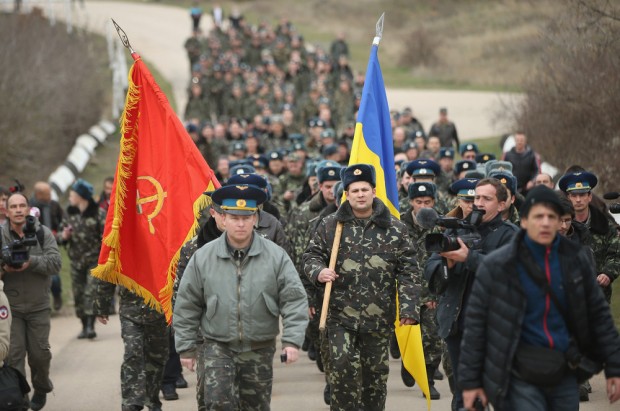
The Ukrainian commander at the head of a column of troops marching to Belbek airbase (Sean Gallup/Getty Images)
1445 GMT: Yesterday Turkey scrambled jets in response to Russian actions:
The Turkish Air Force scrambled eight F-16 fighter jets after a Russian surveillance plane flew parallel along its Black Sea coast, the military said on Tuesday, amid increased tensions between Russia and the West over Ukraine.
1440 GMT: The Russian media outlets in the Russian language have been pumping out propaganda as expected, but some people just tuning in may be more curious about the English language news outlets owned and operated by the Russian government. Who are they talking to?
RT.com has long talked to western liberals who, being tired of Bush’s (failed) ultra-aggressive foreign policy and NSA overreach, are more than happy to watch a “news” outlet that rails against western imperialism and hypocrisy. But this conflict has put RT in a difficult spot. No Russian media outlet has been more guilty of toeing the party line in the last several weeks than RT. And so some people may have been surprised to hear RT anchor Abby Martin launch an angry editorial against Russian intervention in Ukraine:
Glenn Greenwald is impressed by Abby Martin’s show if independence, and points out that RT itself is promoting Martin’s editorial (and Greenwald’s editorial on it):
So is RT really editorially independent? Are they really willing to question the Russian government line? Or are they realizing that people like Martin, and Greenwald, simply aren’t happy with Russia’s actions here, and so in order to preserve influence with their base (western anti-interventionist liberals) they need people like Martin to speak up?
And if it’s the latter, how many people in the West will buy it?
1420 GMT: Yesterday, The Russian Ambassador to the United Ntions, Vitali Churkin, told demonstrably blatant lies and bent facts to the UN Security Council. These weren’t surprising to those who have been paying attention. German Chancellor Angela Merkel spoke to Putin on the phone on Sunday, and then called Barack Obama:
“She was not sure he was in touch with reality, people briefed on the call said. ‘In another world,’ she said,” the New York Times reported.
This morning, Vladimir Putin spoke to reporters, and it became clear exactly what Merkel was talking about:
He spoke for an hour in a ranting, strange, rambling mix of emotions and messages. No one has been able to properly summarize it yet, because it can’t be done. CNN tries to summarize it here, but former Secretary of State Madeleine Albright echoes what almost every single analyst has said so far — Putin really is living in some other world, delusional, maybe even nuts:
Another comment:
Putin lost it: (1) troops in Crimea not Russan (2) Kyiv = "violent seizure power." Gunmen taking Crimean parliament/gov peaceful seizure?
— Taras Kuzio (@TarasKuzio) March 4, 2014
Putin said he did not invade Crimea, does not have troops in Ukraine illegally. So he’s also a liar.
Putin says those in combat dress in Crimea locals.This soldier just confirmed he's Russian infantry #Ukraine #Crimea pic.twitter.com/lAc5131f0X
— Matthew Fisher (@mfisheroverseas) March 4, 2014
And while much of the speech was a rambling mess, the one theme is that Russia may use force, if necessary, to do… something. The justification is so messy at this point it’s not clear what the reasoning is. But the motive is clear, and the stated reasons are simply irrelevant (here’s the 1st part, in English).
Julia Ioffe’s must-read summary covers a lot of ground. Yanukovych gets blamed, but then endorsed. Crimea is peaceful, but overrun by terrorists from Kiev. Democracy is needed in Ukraine, but what if the people vote for someone bad? Ioffe concludes that Putin has indeed lost it, and that makes him impossible to negotiate with:
For the last few years, it has become something like conventional knowledge in Moscow journalistic circles that Putin was no longer getting good information, that he was surrounded by yes-men who created for him a parallel informational universe. “They’re beginning to believe their own propaganda,” Gleb Pavlovsky told me when I was in Moscow in December. Pavlovsky had been a close advisor to the early Putin, helping him win his first presidential election in 2000. (When, in 2011, Putin decided to return for a third term as president, Pavlovsky declared the old Putin dead.) And still, it wasn’t fully vetted information. We were like astronomers, studying refractions of light that reached us from great distances, and used them to draw our conclusions.
But Putin is crazy like a fox. His message is divorced from his actions. The propaganda coming from Russian news and politicians is meant to play to western anti-war liberals and domestic pro-Russian civilians who now also believe, as Putin, the former KGB strongman, does: that Russia is now and always will be locked in a power struggle, a zero-sum game which Russia must win to survive. Putin’s moves in Ukraine are cold and calculated — he wants Crimea, he’ll take more if he can get it, and he’ll make preparations to topple all of Ukraine so that if a deal is negotiated he’ll both win and look benevolent at the same time.
Yesterday, Russia’s ambassador to the UN, Vitali Churkin, accused his American counterpart, Samantha Power, of watching too much American TV. Clearly, however, the problem is the opposite.
